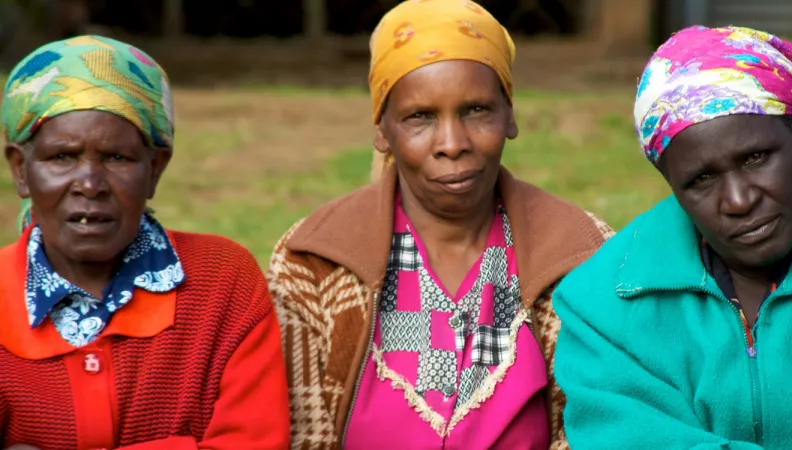Share the page
Improving Living Conditions for Older Kenyans
Published on

With senior Kenyans experiencing high rates of poverty and food insecurity, the government has introduced the Cash Transfer Program for Older Persons, a universal income for people aged over 70. To support this vital initiative, AFD has partnered with Age International & HelpAge International Kenya in a pilot program aiming to improve living conditions for seniors. In the approach to the International Day for Older Persons on October 1, we take a closer look.
Located next to a makeshift car wash along a busy street in Dagoretti, a low income area in west Nairobi, a group of seniors gather every Tuesday morning. It’s a community-based facility dedicated to older Kenyans where they can exercise, socialize and learn new skills.
In areas like Dagoretti and Kibra, older persons tend to struggle to cover their basic needs. Half of the over-60s surveyed in a recent study experience an extremely severe form of food insecurity in Kenya. As they get older, their situation worsens, as they are excluded from the job market and have increasing healthcare expenses. Added to this is the loneliness and isolation they can sometimes suffer.
A basic income to help people make ends meet
That is why AFD is supporting a project aimed at improving access to social protection for marginalized men and women in Kibra and Dagorettti, sub-counties of Nairobi. Since 2017, Kenya has been implementing the Inua Jamii 70+ Cash Transfer Program, a universal minimum old-age income for people over the age of 70.
Further reading: Investing in Informal Settlements
Inua Jamii 70+ (meaning, "uplift the community" in Swahili) is one of the most ambitious programs on the African continent, aiming to introduce a universal minimum income for seniors - currently set at 2,000 Kenyan shillings (about €13) per month. The sum helps people pay for basic food and healthcare.
"I've suffered from asthma for a long time and I have to constantly use an inhaler,” says Peter Kamau, a 77-year-old retired police and security officer. “The help I receive enables me to pay for my medication, which is very expensive. A small bottle costs 1,700 shillings. I can also buy warm clothes."
The costs associated with ageing
But the basic income initiative needs to be fine-tuned, and many people do not yet know about the program. HelpAge International Kenya and local implementing partners (Kenya Aged Require Information Knowledge and Advancement (KARIKA) and Kibera Day Care Centre for the Elderly (KDCCE)) are educating older people about their rights and entitlements with regard to the cash transfer program, and provide legal and logistical support to increase access.
Further reading: Improving Care for the Elderly in Guizou, China
During the initial pilot phase, the cash transfer program is only accessible for those aged over 70 years old. Many people under 70 have stopped working however, and are not yet eligible.
Mary Kanini is 67 years old, partially deaf and diabetic. She was laid off from her last job as a maid because she suffered from high blood pressure. “Right now I do not have any health cover because I am unemployed,” she says.
Learning new skills to earn an income
To support her, the pilot also aims to support the development of income-generating activities for seniors.
Groups like KARIKA and KDCCE encourage people to join Older persons Associations (OPAs), which are self-help groups of about 30 members that engage in small-scale livelihood projects. Mary Kanini, for instance, makes soap which she sells in her neighborhood. She uses some of the profits for her daily needs and reinvests the remaining amount in her self-help group.
“This activity allows me to buy medicine for my blood pressure and sugar levels,” she says.
Beyond the additional income generated, the center run by KARIKA enables her to meet other people. “I spend many hours at KARIKA because I feel calm when I am around my peers,” she says. “I've noticed that it stabilizes my blood pressure, and it keeps me from feeling lonely.”
Other project partners include Payment agents and Banks, the National Gender Equality Commission (NGEC), the Population Studies Research Institute (PSRI-UON), and Nairobi County among others.
